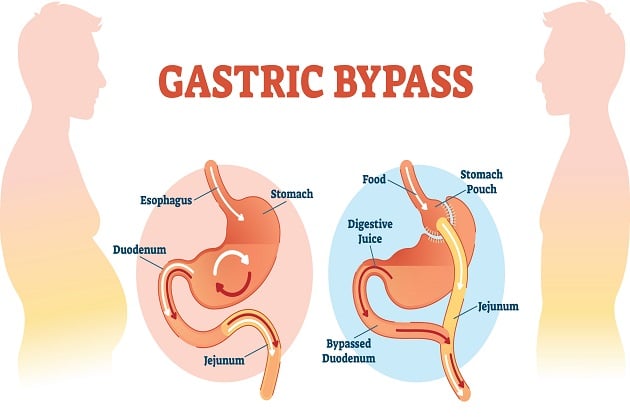Gastric Bypass Surgery: Procedure, Benefits, and Considerations
Gastric bypass surgery, specifically the Roux-en-Y gastric bypass, is one of the most commonly performed and effective weight-loss surgeries worldwide. Designed to help individuals with severe obesity lose weight and reduce the risk of life-threatening health problems, this surgical procedure alters the digestive system to both limit food intake and reduce nutrient absorption. While gastric bypass can bring significant health benefits, it is a serious procedure that requires a lifelong commitment to lifestyle changes.
🔍 What Is Gastric Bypass Surgery?
Gastric bypass surgery involves changing the structure of the stomach and small intestine to promote weight loss and control obesity-related conditions.
The Procedure:
- Creation of a Small Stomach Pouch
- The surgeon divides the stomach, creating a small pouch about the size of an egg.
- This pouch becomes the patient’s new stomach, drastically limiting the amount of food they can eat.
- Bypassing a Portion of the Small Intestine
- The small intestine is cut and rerouted to connect directly to the new pouch.
- This rerouting reduces calorie and nutrient absorption, contributing to weight loss.
As a result, food bypasses most of the stomach and the upper part of the small intestine, which is where much of the nutrient absorption normally takes place.
🏥 Who Should Consider Gastric Bypass?
Gastric bypass surgery is not a cosmetic procedure and is typically recommended for individuals who:
- Have a Body Mass Index (BMI) of 40 or higher, or
- Have a BMI of 35–39.9 with serious obesity-related health conditions such as:
- Type 2 diabetes
- High blood pressure
- Obstructive sleep apnea
- Heart disease
It is usually considered only after other weight loss methods, such as diet, exercise, and medications, have been unsuccessful.
✅ Benefits of Gastric Bypass Surgery
Gastric bypass is not just about weight loss—it can lead to significant improvements in overall health and quality of life.
1. Significant Weight Loss
Most patients lose 60% to 80% of their excess weight within the first 1–2 years after surgery. This can be life-changing for those who have struggled with obesity for years.
2. Improved or Resolved Health Conditions
Gastric bypass can lead to dramatic improvements in many obesity-related diseases, including:
- Type 2 diabetes (often goes into remission)
- High blood pressure
- High cholesterol
- Sleep apnea
- Joint pain and mobility issues
- Heart disease risk
3. Enhanced Quality of Life
Patients often report improved physical functioning, higher energy levels, better mental health, and increased participation in social and family activities.
⚠️ Risks and Side Effects
Despite its benefits, gastric bypass surgery is a major operation with potential risks and long-term side effects.
Short-Term Risks:
- Bleeding
- Infection
- Blood clots
- Breathing problems
- Leaks at the surgical connection sites
Long-Term Complications:
- Dumping Syndrome: Rapid emptying of food into the small intestine, causing nausea, cramping, diarrhea, and weakness, especially after consuming high-sugar meals.
- Nutritional Deficiencies: Due to reduced nutrient absorption, patients can develop deficiencies in:
- Iron
- Vitamin B12
- Calcium
- Vitamin D
- Ulcers and bowel obstruction
- Gallstones, often triggered by rapid weight loss
- Weight regain, particularly if lifestyle changes are not maintained
Patients must commit to lifelong vitamin supplementation and regular medical follow-ups to prevent and manage these risks.
🥗 Life After Gastric Bypass
Gastric bypass requires significant lifestyle adjustments. Success depends on following a strict regimen:
1. Dietary Changes
Patients begin with a liquid diet, gradually transitioning to pureed foods, then soft solids, and finally regular meals. Key dietary rules include:
- Eating small, frequent meals
- Avoiding high-sugar and high-fat foods
- Chewing thoroughly and eating slowly
- Drinking plenty of fluids (but not with meals)
2. Exercise
Regular physical activity is essential to support weight loss and overall health. Many patients begin walking soon after surgery and gradually increase their activity level.
3. Mental Health Support
Behavioral therapy and support groups can help patients adjust to new habits and cope with emotional challenges. Weight loss surgery can impact relationships, self-image, and mental well-being.
🩺 Is It Worth It?
Gastric bypass surgery has proven to be a safe and effective long-term solution for individuals with severe obesity. Most patients experience dramatic improvements in health, increased mobility, and a higher quality of life. However, it is not a quick fix. Success depends heavily on the patient’s commitment to permanent dietary and lifestyle changes.
This surgery is a tool—not a cure—and requires education, preparation, and support from a multidisciplinary medical team including surgeons, dietitians, psychologists, and primary care providers.
🔚 Conclusion
Gastric bypass surgery offers a powerful solution to one of the most pressing public health challenges: severe obesity and its related conditions. With proper guidance, commitment, and ongoing care, individuals undergoing this procedure can achieve long-lasting health improvements and life transformation. However, understanding the benefits, risks, and responsibilities associated with this surgery is essential before making a decision. If you're considering gastric bypass, speak with a bariatric specialist to determine whether it's the right path for your health journey.





Comments